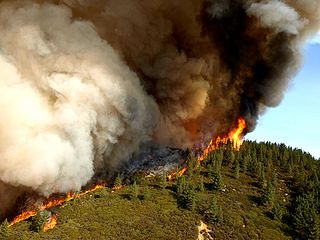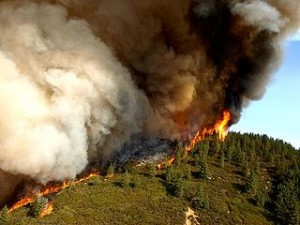
Policy Needed as Americans Feel the Heat
The first six months of 2012 have brought unprecedented weather to millions of Americans. In March alone, 15,000 warm weather records were broken. The last week of June saw 1,456 daily high records according to meteorologist Tom Kines.
Temperatures are not the only manifestation of a changing climate in the U.S., though. This past weekend, deadly thunderstorms ravaged several states on the East Coast with winds of up to 90 mph, leaving roughly 3 million people without power and claiming at least 20 lives. The governors of Ohio, West Virginia, Maryland, and Virginia have all declared states of emergency.
At the same time, the Waldo Canyon fire has become the most destructive fire in Colorado state history forcing thousands from their Colorado Springs homes. The Little Bear fire similarly devastated 240 homes and became New Mexico’s most destructive wildfire on record. Other fires continue to blaze across the West in Utah, Montana, Idaho, and Wyoming. All in all, roughly 1,000 homes have already been destroyed. Over two months of summer still remain.
In the Midwest, growing seasons have lengthened in recent years, and storms have become increasingly forceful. Duluth, Minnesota was hit with flash floods this June causing an estimated $100 million of damage.
Climate scientists have long been warning of climate change impacts such as rising sea levels, stronger hurricanes storms, and more frequent flooding and droughts. In recent years, environmentalists, politicians, and military leaders have regarded climate change as a security threat. And with the effects of climate change ever-present across the entire nation, it is hard to view the phenomenon as anything but a national security threat.
Despite the clear signs of climate change, any hope of concrete policy to mitigate the problem is slim. Mitigation policies (carbon tax, cap-and-trade, pollution mandates, etc.) are widely criticized by public and private actors alike. Exxon CEO Rex Tillerson declared the consequences of climate change to be “manageable.” Colorado firemen, however, have only “managed” to contain 45% of the Waldo Canyon fire since it began on June 23. Pepco, the utility provider in the Washington area, estimates that it won’t “manage” to restore 90 percent of its power outages until Friday at 11 p.m. – a week after the storm.
Tillerson also asserted that climate change is, “an engineering problem [with] an engineering solution.” He may be correct, as geo-engineering technologies, like sulphate aerosols used to block the sun’s infrared heat, become economically feasible. However, engineering solutions are not far enough advanced to offer a feasible alternative to effective policy.
Until engineering is our best weapon to combat climate change, the U.S. should turn to mitigation or adaptation policy. Such a policy could take a number of forms, but one aspect is common to all of them; skeptical lawmakers will provide heavy resistance for two main reasons. First, a climate policy will be touted as too costly. But, what is more costly than the loss of American citizens’ homes and lives? Second, climate change models are riddled with uncertainty and policy should not hinge upon them. Regardless of climate models’ complexities, a walk through Washington D.C. neighborhoods or a flight over the Rockies should be convincing enough evidence for lawmakers to take climate policy seriously.
In a recent interview, British biologist Jonathan Baillie stated, “I’m afraid that only a major catastrophe, that would directly and massively affect people’s lives, would force us to make the changes needed to stop this decline.” Today, with American citizens enduring the harmful impacts of weather events, climate legislation has no agenda on Capitol Hill. Rather than waiting for major catastrophe, our leaders should learn from those already felt this year and address the threats climate change poses to our national security.







[…] and it is no longer an issue anyone can ignore. In March alone, 15,000 warm-weather records were broken. The Colorado wildfires raged for weeks, destroying homes, livelihoods and thousands of acres of […]